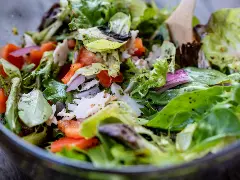

Cucumbers are nutritious and low in calories and are a healthy choice for the evening snack.
Key Points
- Cucumbers have high water and fiber content
- Cucumbers are packed with nutrients
- There are many varieties of cucumbers
In this time of the year we have plenty of fresh veggies to choose from to prepare healthy and delicious meals. My favorite are cucumbers, fresh and juicy for delicious late summer salads and for doing pickles for the winter (this will be a subject for my next post because pickles are very good for our gut health).
The cucumber originated in Asia and is now grown all over the world. The cucumber is an annual creeping vine plant in the family of cucurbitaceace. It is considered a vegetable, but (it may came as a surprise to many readers), because it grows from a flower and contains seeds, it is botanically a fruit. Reportedly, it was a favorite veggie of the Roman Emperor, Tiberius. He wanted to eat them every day, so the cucumbers were grown for him in raised beds on wheels to make it easy to move them under protection during winter.
There are 3 main types of cucumbers: slicing, pickling and seedless, but there are about 100 different varieties of cucumbers such as English, Persian, White, Lemon, Gherkin etc. Therefore, there is a lot to choose from to find your favorite variety. For salads, the culinary experts recommend the English and Persian varieties because they have a thinner skin and smaller seeds than other varieties. You can also make a cucumber gazpacho or a cucumber sandwich (you can find many recipes on the internet).
Cucumbers are low calories (only 16 calories in a cup), but are packed with nutrients and fiber that helps with digestion and constipation. They have high water content (cucumber consists 95% of water!), which helps with hydration. Because of the high water content, they are a very good choice for a summer salad. Because of its low calories and high fiber content that helps you feel full, it is a good choice for a weight loss. Cucumbers may also help balance the blood glucose level.
Cucumbers have many antioxidant and anti-inflammatory properties. They are also rich in vitamins such as vitamin B (helps with metabolism, healthy skin, brain and body tissue), vitamin C (boosts immunity and collagen production), vitamin K (helps with bone health and blood clotting) and vitamin A (important for eye health and immune system). Cucumbers also contain minerals such as potassium, magnesium, folate, zinc, choline, phosphorus, manganese, molybdenum and copper. If the cucumber is organically grown or it comes from your garden, you can eat the peel as well, because it is also packed with nutrients. I never peel any veggies that I grow.
In my garden I am growing white cucumbers (Salt and Pepper Cucumbers), lemon cucumbers (which are round and look like a lemon) and of course pickling cucumbers. White and lemon cucumbers are small and just enough size for one small snack. If you slice one of them and put a little humus on each slice (hummus is also a low calorie food) it makes for a delicious snack.
So, if you are a person that has a habit of having an evening snack, try having just a sliced cucumber instead of some unhealthy snacks. Cucumbers are nutritious and low in calories and are a healthy choice for the evening snack. Bon Appetite!
About the Author Barbara Koltuska-Haskin, Ph.D., is a neuropsychologist in private practice in Albuquerque, New Mexico with over 30 years of clinical experience, and the author of How My Brain Works: A Guide to Understanding It Better and Keeping It Healthy. Her book has won 2 International Book Awards and 5 National Book Awards.
Barbara Koltuska-Haskin, Ph.D., is a neuropsychologist in private practice in Albuquerque, New Mexico with over 30 years of clinical experience, and the author of How My Brain Works: A Guide to Understanding It Better and Keeping It Healthy. Her book has won 2 International Book Awards and 5 National Book Awards.
Dr. Barbara Koltuska-Haskin has received her first foreign translation. How My Brain Works was recently translated into Polish and published in Poland.

Sambou, A. et al. “Nutritional values of green and white cucumber (Cucumis sativus L.) and African horned cucumber (Cucumis metuliferus E.)” Journal of Holiculture and Postharvest Research. Vol. 6, issue 3, Sept 2023.
Uthpala, T. et al. “Nutritional Bioactive Compounds and Health Benefits of Fresh and Processed Cucumber (Cucumis Sativus L.) “ Sumerianz Journal of Biotechnology, Vol. 3, No. 9 , 2020
Mallick, P.K. “Evaluating Potential Importance of Cucumber (Cucumis sativus L- Cucurbitaceae): A Brief Review.” International Journal of Applied science and Biotechnology, Vol 10 (1), 2022.







Comments
Post a Comment